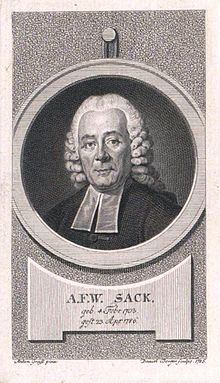August Friedrich Sack
August Friedrich Wilhelm Sack (born February 4, 1703 in Harzgerode , † April 22, 1786 in Berlin ) was a German philosopher , theologian , famous pulpit speaker and writer.
Life
He was a representative of Christian Wolff's school . He was called to Berlin in 1740 as court and cathedral preacher . His importance lies in his social activities and his tolerance, so he campaigned for the Torah (high) school in Frankfurt / Oder.
He was the eldest son of the mayor of Harzgerode, Daniel Sack, and his wife, nee Voigt. The family came from Nordhausen . After attending school in Harzgerode, at the age of 15 he went to high schools in Bernburg and Zerbst and in 1722 went to the University of Frankfurt (Oder) to study Protestant Reformed theology. After working as a private tutor, he went on an educational trip to Holland. On June 16, 1731 he was appointed third preacher in the German Reformed congregation in Magdeburg . He was very popular in the community and quickly found access to the educated families of the city's Franco-Walloon colony . His first marriage ended around 1733 after the birth of his first daughter Antoinette , as a result of which the mother died in childbed. On May 7, 1737 he married Marie Garrigues, a daughter of the goldsmith Jacques Garrigue in Magdeburg, and in the same year was appointed the first preacher and in 1738 consistorial councilor and inspector of the Reformed churches in the Duchy of Magdeburg .
In 1740 he was ordered to Berlin to give trial sermons to King Friedrich Wilhelm I , which earned him the appointment of third court and cathedral preacher in Berlin. He took office after the formal appointment on June 1, 1740. In 1744 the new King Friedrich II appointed him a member of the Academy of Sciences and in 1750 a senior consistorial councilor. In the following year he was appointed to visit the reformed Joachimsthal'schen Gymnasium in Berlin.
At the beginning of the Seven Years' War , he moved with the court to the Magdeburg Fortress and taught and confirmed the heir to the throne in Magdeburg. His sermons of thanks on various victories of the war have appeared in print. Sack took care of the training of young theologians and published a number of theological writings. A long, serious illness prevented him from fulfilling his obligations at times. Only after extensive spa stays did he return to his official business. In 1777 he was able to witness the appointment of his son Friedrich Samuel Gottfried Sack from his second marriage to the fifth court and cathedral preacher. With his last sermon in Berlin Cathedral on August 27, 1780, he resigned from his position as cathedral preacher.
August Friedrich Sack died in Berlin in 1786 at the age of 83. He was buried in the churchyard at the Dorotheenstädtische Church . The tomb was lost when the church and churchyard were leveled in 1965 at the latest.
Fonts
- Three sermons of thanks about the victories of the great King Friedrich II in 1757 in Berlin in 1857.
- Defended Faith of Christians Berlin 1748–1751.
- Biographies along with some of the writings he left behind .
literature
- Siegfried Lommatzsch: Sack, August Friedrich Wilhelm . In: Allgemeine Deutsche Biographie (ADB). Volume 37, Duncker & Humblot, Leipzig 1894, pp. 295-307.
- Johannes Fischer: The French colony of Magdeburg. City of Magdeburg, Magdeburg 1942, ( Magdeburger Kultur- und Wirtschaftsleben 22, ZDB -ID 545106-1 ).
- Mark Pockrandt: Biblical Enlightenment. Biography and theology of the Berlin court preachers August Friedrich Wilhelm Sack (1703–1786) and Friedrich Samuel Gottfried Sack (1738–1817) . Walter de Gruyter, Berlin a. a. 2003, ISBN 3-11-017836-2 , ( Works on Church History 86), (At the same time: Berlin, Humboldt-Univ., Diss., 2002).
Web links
- Literature by and about August Friedrich Sack in the catalog of the German National Library
Individual evidence
- ^ Hans-Jürgen Mende: Lexicon of Berlin burial places . Pharus-Plan, Berlin 2018, ISBN 978-3-86514-206-1 , pp. 40–41.
| personal data | |
|---|---|
| SURNAME | Sack, August Friedrich |
| ALTERNATIVE NAMES | Sack, August Friedrich Wilhelm (full name) |
| BRIEF DESCRIPTION | Protestant theologian |
| DATE OF BIRTH | February 4, 1703 |
| PLACE OF BIRTH | Harzgerode |
| DATE OF DEATH | April 22, 1786 |
| Place of death | Berlin |

